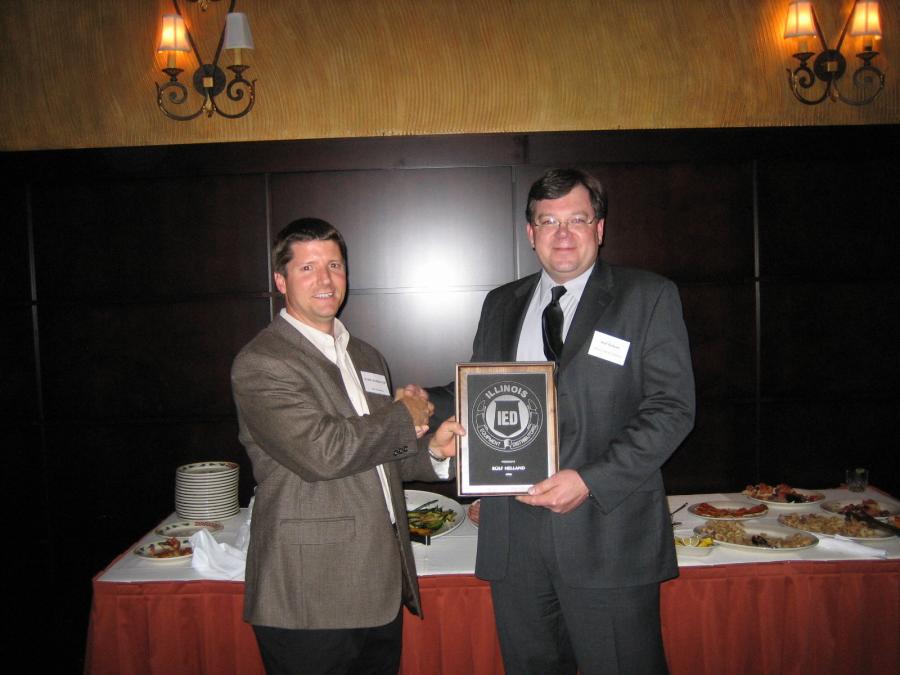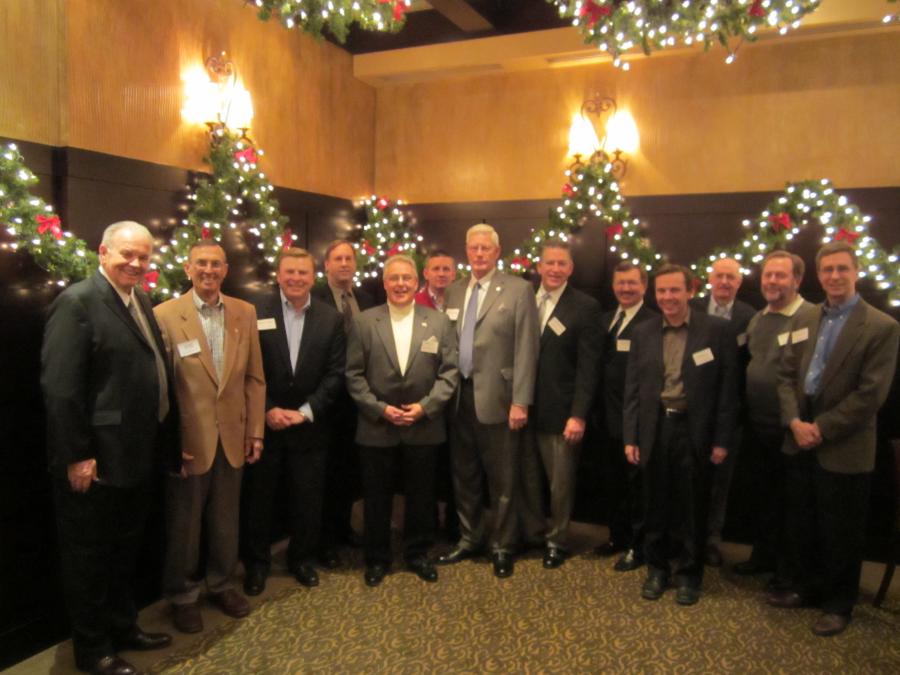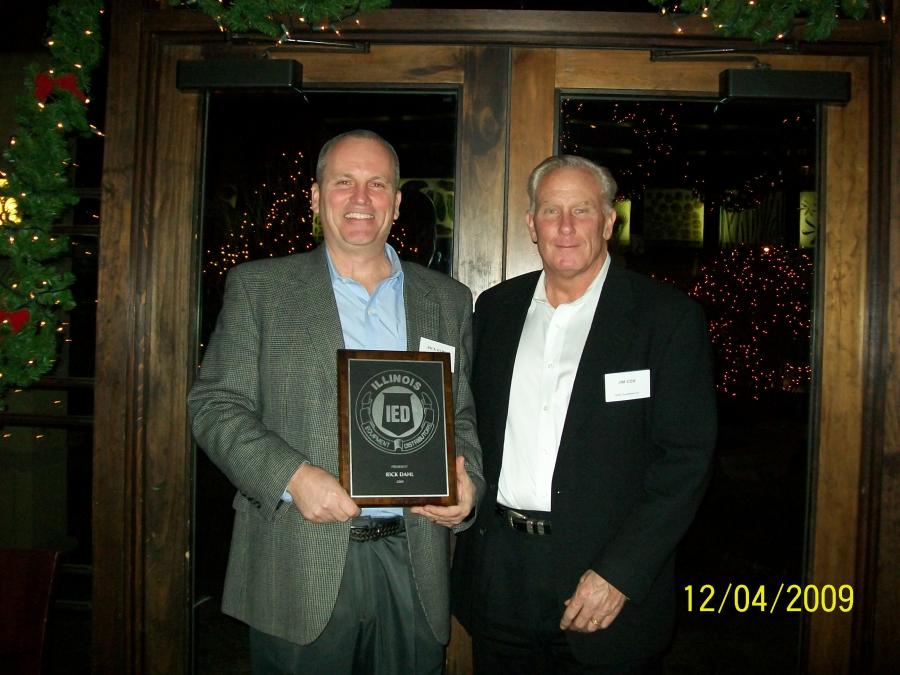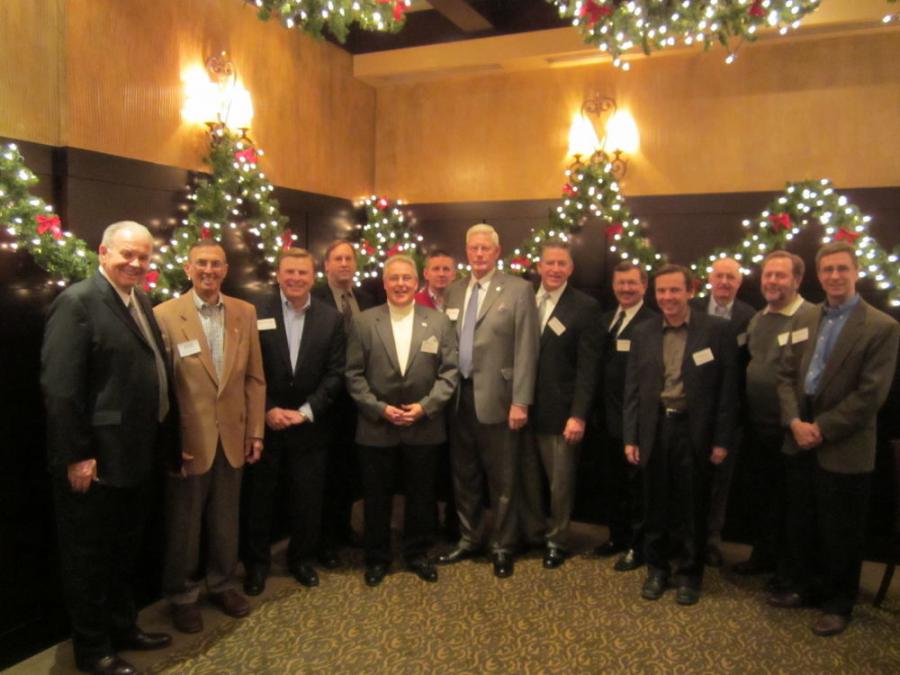Past Presidents of IED and the 2012 IED Board (L-R) Bruce Pipkin, Dick McCann, Dennis Kruepke, Tom Stern, Barry Heinrichs, Chuck Wingard, Robert Sloan, Steve Dillon, Bob Jones, Tom Novak, Hugh Goulding, Marty Ahrendt and Steve Nenn.
Industry associations exist to benefit association members — and the pooled energy of its members is what makes an association work. This synergy has worked for Illinois Equipment Distributors for 70 years. The challenge now is maintaining the mutually beneficial relationship in a changing heavy equipment industry.
A couple of generations of dealer executives have retired since IED was founded, but Howell Tractor and Equipment has been there from the beginning. The company changed names last year when it was acquired by Michigan-based Alta Equipment. Howell Tractor and Equipment (now Alta Equipment) is a state-line dealership, with full-service facilities in Peru, Ill., and Gary, Ind. The Gary facility is the only Indiana dealership represented by IED.
Howell Tractor and Equipment was one of a handful of equipment distributors that came together in 1951 to form what then was called Illinois Construction Equipment Distributors. The association's business address has changed several times since then, moving across the Chicago metro area, but its focus hasn't wavered. Michael Morton, Alta's regional director of product support, said the purpose always has been "to advance and strengthen our industry."
During the pandemic, Morton — who is treasurer of IED — said the association emerged as "the eyes and ears of the industry. People wanted to know what was going on, what the new COVID regulations were, what they needed to do to keep their workplaces safe and so on."
The ability to flex its mission and adapt to changing business and industry conditions is key to IED's continued viability. It will determine if the association has another 70 years in it.
**
Earl K. Harbaugh called Illinois Equipment Distributors an "entrepreneurial organization." Harbaugh knows about entrepreneurship. He has started several successful companies and is CEO of Ditch Witch Midwest, which he founded in 1970. A longtime IED member, Harbaugh said forming of the organization was about bonding dealers.
"Because we had to get things done with legislators, financial institutions we worked with and manufacturers. That was the whole thrust. That and working together," he said.
Any entrepreneurial venture involves initiative and risk-taking. For IED members, the risk for members involves working with competitors. It can be a little unnerving to socialize with someone you darned well know is eager to win a bigger share of the equipment market at your expense. Yet it ultimately is mutually beneficial.
Jim Cox is president of another long-term IED member, Casey Equipment. He said he can't speak to the thinking of his father, Don Cox, who co-founded the company, except to say his father and others supported IED in the early days to get to know other area equipment distributors.
"Today, the IED relationships are still the same," he said. "Most members have a kind of mutual respect for one another and an adversarial feeling at the same time. We enjoy the social part of it and then go compete the next morning."

Rolf Helland (R) of Illinois Truck & Equipment accepts the President's Award from Mark Harbaugh of Ditch Witch Midwest.
Bob Jones attributes his IED work with developing what he calls "business friends." Jones is vice president of sales at SES, a West Chicago equipment distributor that opened its doors in 1968.
"I would never have developed relationships with competing dealers without IED," said Jones. "You just don't. But serving together on the IED board, you develop closer relationships. As we each pursue business in the industry, issues come up that affect us all."
Still, there is awareness that members are competitors.
"Though you know each other, you still do battle. I bid some stuff today in competition with others. But we don't bring any of that to IED," said Jones. "It is all very civil. It would be different if we were attending a meeting where we had customers, but we are all distributors and at the same level. That's a different dynamic. So, IED is a place you can develop some business friends."
McCann Industries has been involved with IED for about 40 years, after company founder Richard J. McCann brought his company aboard. His son, Jim McCann, is company president today, presiding over nine locations in the Chicago metro area. He recalls that his father was interested in networking and sharing information, "in particular the growth of the rental industry. We were getting into construction rental and IED was a platform for us to share ideas with others.
"It's an important association for us and we're proud to be active members," McCann said. "What makes IED different than some other chapters is there is a level of responsibility that IED feels to the industry. We have all worked well together and each done our share of giving back. That's not the case in some chapters. We are pretty friendly with each other and carry a torch to ensure the mission of IED is carried on."
Adam Salinas of Illinois Truck and Equipment — current IED vice president — also cites "networking with industry peers in a noncompetitive manner" as a major benefit of IED membership.
"None of us are disclosing trade secrets," said Salinas. "We're all in the same business and we have things to learn from one another."
**
Everyone cites the cross-pollination of ideas and information that come from attending association events as a primary reason to participate in the association. Yet it is IED's work on industry issues that has produced some of the most impressive fruit.
A notable accomplishment occurred in 1985 when Illinois Equipment Distributors worked with legislators to include construction and industrial machinery dealers in the state's Illinois Farm Equipment Dealership Act. The legislation protected dealers in the event a manufacturer-dealer relationship ended, requiring a manufacturer to repurchase the inventory of a dealer.
Twenty-two years later, IED led the way in protecting distributors in a different scenario. It involved non-payment to distributors for rented equipment when a construction project stalled for some reason. That is, a developer and contractor would get into a dispute, and a third party — equipment distributors — would pay the price.
"If a contractor didn't get paid on a project, we didn't get paid for our rented equipment. The IED board started looking at the situation," recalled Mark Harbaugh, president of Ditch Witch Midwest.
In response, a mechanic's lien bill was introduced and passed in Springfield so that "it didn't matter if a developer got in a tiff with a contractor, our portion of the owed money for equipment had to get cleared up before the developer could take occupancy," Harbaugh said.
The legislative accomplishment earned IED a Founders Award that year at the Associated Equipment Distributors national convention.
Another issue involved full payment of mechanics for warranty work.

Past Presidents of IED and the 2012 IED Board (L-R) Bruce Pipkin, Dick McCann, Dennis Kruepke, Tom Stern, Barry Heinrichs, Chuck Wingard, Robert Sloan, Steve Dillon, Bob Jones, Tom Novak, Hugh Goulding, Marty Ahrendt and Steve Nenn.
As Cox explained, "Working in conjunction with the farm equipment dealers in Illinois, we sought to have manufacturers pay prevailing wages on our warranty reimbursements. It was a huge thing. They would pay us 60 or 75 cents on the dollar instead of what the labor cost really was. Some manufacturers randomly selected an hourly wage to reimburse, but that isn't the same across the country. A mechanic's hourly wage in Alabama might be completely different than that of a mechanic in Illinois."
The distributors won on that issue, too.
McCann said an issue on the horizon for equipment distributors concerns so-called "right to repair." Manufacturers in some industries purposely don't offer genuine replacement parts and otherwise thwart end-users or owners from repairing something themselves or taking it to an independent repair shop.
"This monopoly on repair is worrisome," said McCann. "Longer term, it could be a detriment to dealers."
The national distributors' organization, AED, is the principal lobbying arm for dealers when an issue is national in scope. That's because AED — able to draw members from the whole country — brings a bigger megaphone to a shouting match. More members equal more clout.
"IED is more focused on the state, on northern Illinois and northwest Indiana," said Jones. "So, when we are talking about a tax increase issue or a legislative issue, you can get some support from AED, but it really doesn't address local issues. When IED was started, it was the local issues that were so very important to them."
McCann Industries is supportive of both AED and IED, according to Jim McCann.
"AED delivers real benefits to us, but we are equally involved with IED," he said. "I don't know that one delivers more value than the other. They just allow different aspects of our business to be engaged and represented."
**
Any organization that has existed for 70 years has weathered more than one cultural and/or consumer shift. Technological advancements. Changed expectations about labor and the workplace. Transformations in the economy. Heavy equipment distributors need look no further than the equipment in their yard to see the stark difference in machinery since the 1950s.
The question is, have all of these developments rendered Illinois Equipment Distributors less valuable to the businesses it serves?

(L-R): Andy Bazan, Bob Joynt and Marty Ahrendt, all of Finkbiner Equipment, and Steve Nenn of Wells Fargo Equipment Finance show off their award at IED's Golf Outing.
"When IED started out, most of the companies were family-owned dealerships. Some of them have always been owned by family. They started out small, with one location, maybe two, and grew from there and are in the second or third generation of the family," Jones said. "Do they need IED less now? It's difficult to say. It's just that they have more responsibility."
Which is to say, growth of a company sometimes translates into less active participation in the state organization.
Steve Benck can identify with that. The president of West Side Tractor Sales said he recalls his father attending IED meetings. A sales manager of West Side Tractor Sales, Tom Stern, retired from the company in 2019 and is executive secretary of IED.
At some point, Benck said he began to lose interest in being engaged with the organization.
"I was active early on, but in the last 20 years I haven't been going to many meetings. It was more that the company was growing and making acquisitions. I had kids in soccer and so on."
He believes the association tends to benefit smaller businesses in its membership.
"The John Deeres and Caterpillars and Komatsus and Volvos tell us what we are going to do and some of us tend to focus on that rather than on the local association," he said.
He said when he was more actively engaged, membership was primarily "heavy dirt equipment guys," but IED has expanded its membership since then.
"There is definitely a place for IED. It's a good organization," Benck said. "I think it fills a need. The challenge is keeping membership fresh and people coming out to participate. That's the challenge."
Part of that challenge is the indifference of many millennials toward traditional memberships, in business and elsewhere. They interact with the industry differently as customers — the old days of face-to-face interaction while sitting in an office has gone the way of electronic communication and independent evaluation of equipment before a first contact with a dealer.
Said Jones: "It's a different dynamic."
Jason Zeibert is president of Finkbiner Equipment, an Illinois Equipment Distributors member for 50 years. Zeibert also is the current president of IED. Several of the people previously quoted in the article have served as president over the years, some of them more than once. The current president seems fully aware of the need to have active members.
"Does IED have another 70 years in it? That depends on member participation, like any association," Zeibert said. "Members need to keep coming back every year, not only coming back but participating. The viability of any association is member participation."
To encourage fuller participation, he talks to members about the value of the peer-to-peer network that is the core part of the organization.

Outgoing 2009 IED president, Rick Dahl (L) of Metrolift Inc., receives a plaque from incoming 2010 IED president, Jim Cox of Casey Equipment.
"The ability to talk to a counterpart about common issues and challenges and get feedback is so valuable. You know, ‘You're going in the right direction' or ‘I'm looking into doing that, too,'" he said.
Though many of the obstacles to success facing equipment distributors in the 1950s are the same today, Zeibert cites a major difference.
"Managing the pace of technology is difficult. There always have been advances in technology, of course, but the difference in the pace of change then and now is significant. I have dealers today who are really grappling with technology changes, internally and externally. Peer-to-peer interaction can help with that."
The association conveys valuable information to members by hosting events featuring specialists. A regular feature is a quarterly credit manager meeting to keep accounts receivable personnel current with financial rules. Another example: A CPA was invited a while back to deliver a PowerPoint presentation on accounting issues, an event that Jones recalled "impacted everyone."
He said bringing experts in to address a particular issue can happen as often as members want it to happen.
"If a couple of members see something that needs airing, with a little notice we can get somebody in to talk about that at the next meeting. IED is dealer-centric," said Jones.
Several years ago, the association invited some large real estate company brokers to address the group and give them an idea about how the property market might be changing, with consequences for construction contractors and dealers.
"They talked about how in the next five to 10 years development would occur beyond industrial parks, that developers would be buying farmland and knocking down old properties and building mega-centers with rail spurs, huge structures with hundreds of thousands of square feet," Jones. said.
He also said the presentation was "spot on. It was about Amazon's development of centers to serve the overnight package market for homeowners."
Such future-thinking is the sort of heads-up that equipment dealers can utilize in decision-making about inventory and rental fleet.
**
So, where does Illinois Equipment Distributors go from here? Alta Equipment's Michael Morton said he is hoping for continued networking.
"The equipment industry is a relationship business. The ability to connect to someone on a personal level is huge. My hope is that IED continues to provide the opportunities to break bread and otherwise provide a platform for these relationships."
Increasing membership from the current 35 companies is seen as a must. Zeibert believes there are opportunities to do so.
"It lies primarily outside the traditional industry that IED represents now, road-builders and such. We should look to the crane industry and utility industry and others that can benefit from our platform and experience."

IED President Barry Heinrichs (L) presents Hugh Goulding (R), IED executive secretary, with an IED plaque honoring his 30 years of service to IED as executive secretary. The plaque is held by Hugh's wife, Adrienne.
Enrolling more tech companies as associate members is a natural addition to membership, several suggest, because of all the technology that dealers depend upon in their rolling stock as well as in their offices. Expansion of membership criteria is part of what Salinas — who will move up from vice president to president in a few weeks — calls "adapting to change. I feel we have done that. but we have to continue doing it to maintain our relevance."
Morton goes one step further and wonders if there isn't a place in membership for others across the equipment spectrum.
"Personally, I'd like to see the end-user and the OEM have voices in the association, so we don't become too inwardly focused."
Stern said such changes in membership criteria are possible, but not without a membership vote.
"The founding principles of IED were wonderful at the time, but one reason we've stayed relatively small is that our bylaws prevent us from opening up to other members, except associate members. Altering the bylaws is the answer, but the membership will have to vote to do so."
Earl K. Harbaugh is proud that Illinois Equipment Distributors is "the strongest chapter in the country. Still going strong after 70 years."
His son Mark Harbaugh agrees.
"That is quite an accomplishment, to last for 70 years. It's a testament to IED and the buy-in of the people who are associated with it."
Still, issues loom of great importance to the equipment industry, one of them being the chronic shortage of skilled tradespeople. Mark Harbaugh hopes IED can address that issue.
"I would love to see the association engage trade schools or get back to engaging high schools and community colleges and get the trades back into the schools. They've lost all the classes that once gave kids an avenue to get into the trades."
Harbaugh continued: "Kids can make a boatload of money and we need to figure out how to engage them. We don't have enough coming up in the trades. The ponds we are all fishing out of for skilled help are so overfished. That's the biggest challenge we have today."
Cox believes some things don't change and that the value of the association is one of them.
"IED has done a great job of keeping us informed, bringing us information on situations we haven't had the time nor inclination to be aware of. That hasn't changed from the beginning, nor will it ever change."
He said Casey Equipment has found Illinois Equipment Distributors to be "an incredibly valuable tool. It has created some great relationships for us with other dealers, and with vendors and suppliers as associate members, the kind of relationships that all dealers should want. It's a tide-raises-all-boats kind of thing."
(All photographs in this article are Copyright 2021 Construction Equipment Guide. All Rights Reserved.) CEG
Today's top stories
























